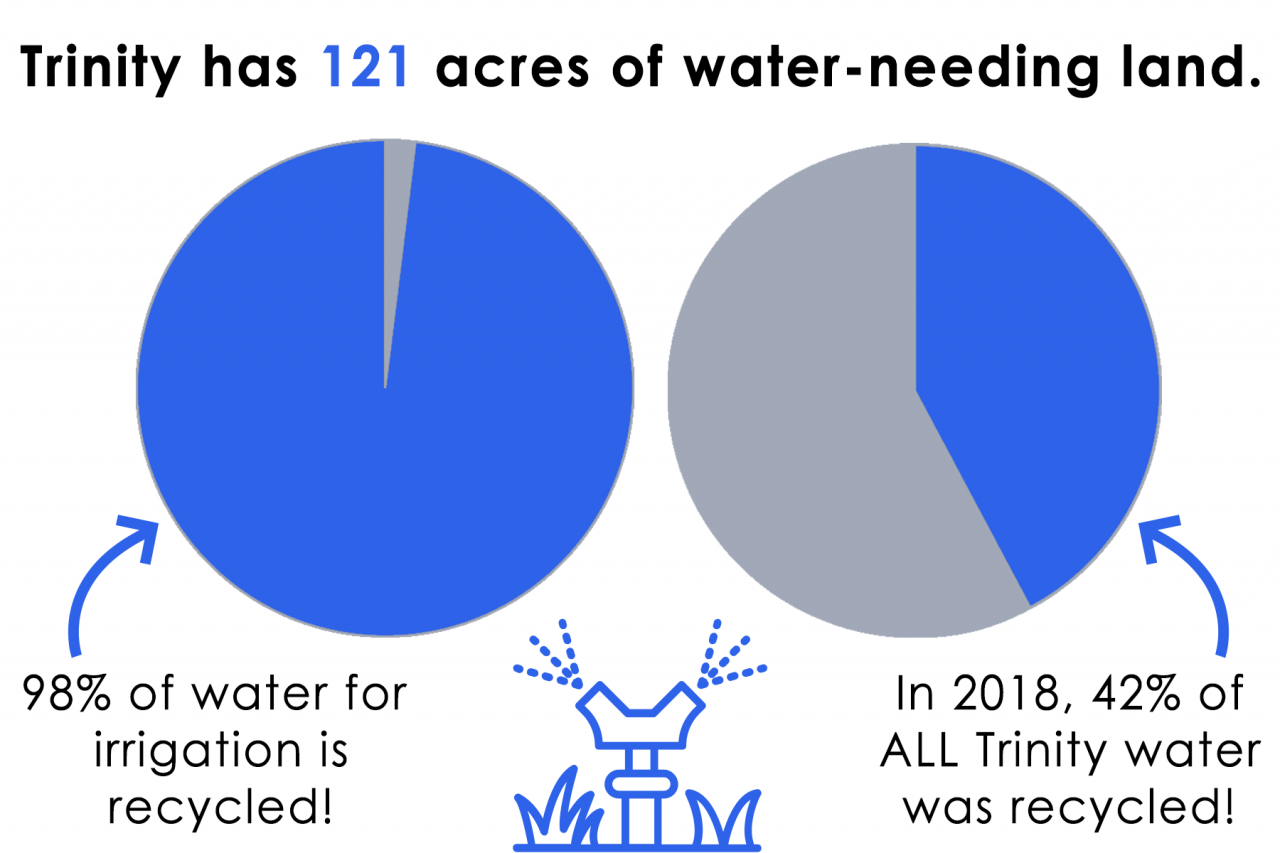Graphic by Alexandra Parris
Trinity’s grounds management team is responsible for maintaining Trinity’s landscape, working on a variety of different landscaping projects throughout the year. Over the last five years, about $6,500 has been spent on landscaping each year. This money is part of the larger budget for Facilities Services. Currently, the department is focused on preparing for summer remodels.
“Most of our projects right now are orientated around summer remodels,” said Jim Baker, director of Facilities Services. “As we get closer to summer, we’ll be preparing for them to work around the buildings, and then after we’re done, we’ll be restoring the landscape back around those projects.”
Gordon Bahmfalk, university architect and director of Sustainability, explained that landscaping is an important part of the campus master plan.
“The landscape component of that is really all about the experience between the building and the landscape,” Bahmfalk said. “We have design guidelines in our master plan. One of our guidelines is deference to landscape, so it’s both about being inside the building and outside the building and how the buildings are designed to the landscape. I think CSI has set a direction that we intend to go with, and that’s more native landscapes and more native plants.”
One project that is ongoing is simply maintaining the landscape. Trinity has 121 acres of land that require watering attention, and 98 percent of the water used for irrigation is recycled water provided by the San Antonio Water System (SAWS) at a discounted price. In 2018, 42 percent of all water used at Trinity was recycled water.
Richard Reed, professor of sociology and anthropology, explained that Trinity was one of the first entities in San Antonio to use recycled water from SAWS.
“Trinity was really on the forefront of using recycled water, which was really good,” Reed said. “The other half of the story though is that they went from being severely limited in how much water they could use for irrigation to having unlimited supplies of irrigation water. I’ve often times made the argument that if it doesn’t go onto our lawns, it could go back into the river. But most people who are interested in water quality don’t want it in the river because it has enough contaminants that it’s not really good for the environment. So dumping it on our landscape and letting it evaporate is, in many ways, the best thing that could happen to it.”
Although Reed does not see any evidence of water waste at Trinity, he believes that using recycled water removes any incentive to conserve water.
“What our use of recycled water doesn’t do is promote any kind of water conservation,” Reed said. “If there were greater efficiency [in] use of water by the city, we wouldn’t have all this recycled water. But we do, which goes to show that there is still a considerable amount of water being wasted at the city level. Nor is there incentive to have low use plantings. All of the grass that we have on campus, all of the flower beds we have on campus take a tremendous amount of water.”
Even though recycled water may not provide direct incentives for conservation, Bahmfalk hopes that it will still be used appropriately.
“We still want to be good stewards of that water and use plants that are responding to place and being native,” Bahmfalk said.








Dana Nichols • Apr 8, 2019 at 11:28 am
Regarding Richard Reed’s comments on water quality of recycled water … “But most people who are interested in water quality don’t want it in the river because it has enough contaminants that it’s not really good for the environment. So dumping it on our landscape and letting it evaporate is, in many ways, the best thing that could happen to it.”
Actually, the SAWS recycled water IMPROVES water quality in the river where it is discharged. So it is a huge benefit to the river all the way to the bays and estuaries. Trinity could cut back significantly on its recycled water use. So much of the landscape is established and there are deep soils in the area and run-off from overspray in the street is often seen and reported.